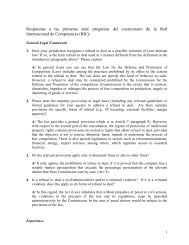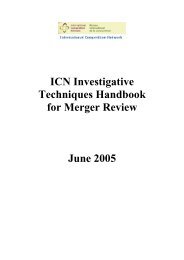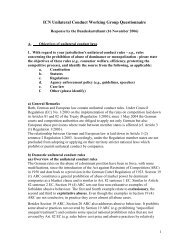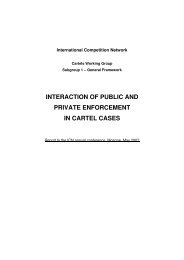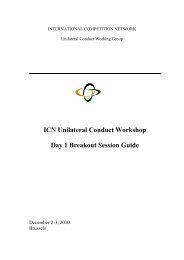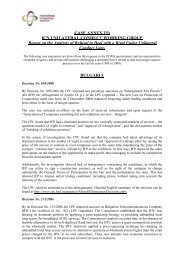Setting of Fines for Cartels in ICN Jurisdictions - International ...
Setting of Fines for Cartels in ICN Jurisdictions - International ...
Setting of Fines for Cartels in ICN Jurisdictions - International ...
Create successful ePaper yourself
Turn your PDF publications into a flip-book with our unique Google optimized e-Paper software.
2. PRELIMINARY ISSUES<br />
2. PRELIMINARY ISSUES 7<br />
The law which empowers the sanction<strong>in</strong>g <strong>of</strong> cartels with f<strong>in</strong>es (and/or other sanctions) <strong>in</strong> a jurisdiction can<br />
be part <strong>of</strong> crim<strong>in</strong>al law, adm<strong>in</strong>istrative law, or civil law. However, <strong>in</strong> certa<strong>in</strong> jurisdictions the dist<strong>in</strong>ction between<br />
these categories <strong>of</strong> law is more hard-and-fast than <strong>in</strong> others. In Switzerland, <strong>for</strong> example, adm<strong>in</strong>istrative sanctions<br />
have a penal character6. The def<strong>in</strong>ition <strong>of</strong> cartels as a particular k<strong>in</strong>d <strong>of</strong> <strong>of</strong>fence does not necessarily<br />
impact on the methodology <strong>for</strong> sett<strong>in</strong>g f<strong>in</strong>es (although it probably will determ<strong>in</strong>e which authority sets the<br />
f<strong>in</strong>e).<br />
This chapter covers four basic issues <strong>of</strong> organisation and pr<strong>in</strong>ciple regard<strong>in</strong>g f<strong>in</strong>es:<br />
1. What is the basic “philosophy” or objectives <strong>of</strong> f<strong>in</strong>es <strong>in</strong> the respond<strong>in</strong>g jurisdictions;<br />
2. What is the legal basis <strong>for</strong> impos<strong>in</strong>g f<strong>in</strong>es <strong>in</strong> the jurisdiction <strong>in</strong> question;<br />
3. Which authority determ<strong>in</strong>es the amount <strong>of</strong> the f<strong>in</strong>e;<br />
4. Are f<strong>in</strong>es (on companies or <strong>in</strong>dividuals) the only weapon <strong>in</strong> the arsenal aga<strong>in</strong>st cartels <strong>in</strong> the jurisdiction<br />
<strong>in</strong> question, or are there others?<br />
2.1 Objectives and “philosophy” beh<strong>in</strong>d the imposition <strong>of</strong> f<strong>in</strong>es<br />
It should be mentioned at the outset that the economic underp<strong>in</strong>n<strong>in</strong>g <strong>of</strong> f<strong>in</strong>es, and the concept <strong>of</strong> the “optimal”<br />
f<strong>in</strong>e was covered <strong>in</strong> the 2005 <strong>ICN</strong> report (see footnote 2 above). However, the l<strong>in</strong>k between theory <strong>of</strong> optimal<br />
f<strong>in</strong>es <strong>for</strong> deterrence, and actual methodologies used <strong>for</strong> sett<strong>in</strong>g f<strong>in</strong>es is <strong>of</strong>ten tenuous, partly because the<br />
statistical <strong>in</strong><strong>for</strong>mation needed to set economically optimal f<strong>in</strong>es (amount <strong>of</strong> excess pr<strong>of</strong>it ga<strong>in</strong>ed, likelihood <strong>of</strong><br />
detection) is very difficult to obta<strong>in</strong>.<br />
Several competition authorities noted that their f<strong>in</strong><strong>in</strong>g policy <strong>in</strong> cartel cases pursues multiple goals (deterrence,<br />
retribution, recovery <strong>of</strong> excess cartel pr<strong>of</strong>its), and these are not mutually exclusive. Hav<strong>in</strong>g said this, the vast<br />
majority <strong>of</strong> respond<strong>in</strong>g agencies have <strong>in</strong>dicated that f<strong>in</strong>es are <strong>in</strong>tended to deter the addressees from engag<strong>in</strong>g<br />
<strong>in</strong> the same illicit conduct <strong>in</strong> the future (i.e. specific deterrence), as well as to dissuade other potential <strong>in</strong>fr<strong>in</strong>gers<br />
from <strong>for</strong>m<strong>in</strong>g or jo<strong>in</strong><strong>in</strong>g anticompetitive cartels (i.e. general deterrence) 7 . Some agencies mentioned other<br />
aims <strong>in</strong> addition, others did not.<br />
For example, a number <strong>of</strong> agencies have also mentioned the need to punish the corporate cartel participants<br />
<strong>of</strong> the <strong>in</strong>fr<strong>in</strong>gement 8 , while a few respondents referred to the objective <strong>of</strong> recover<strong>in</strong>g any unlawful ga<strong>in</strong>s obta<strong>in</strong>ed<br />
by the cartel participants at the expense <strong>of</strong> their customers 9 . F<strong>in</strong>ally, the US and Canadian authorities <strong>in</strong>dicated<br />
that, when determ<strong>in</strong><strong>in</strong>g the appropriate f<strong>in</strong>es, courts must consider, <strong>in</strong>ter alia, the need to provide restitution<br />
to any victims <strong>of</strong> the <strong>of</strong>fence 10 .<br />
Accord<strong>in</strong>gly, pursuant to its 2006 guidel<strong>in</strong>es, the European Commission “will also take <strong>in</strong>to account the need<br />
to <strong>in</strong>crease the f<strong>in</strong>e <strong>in</strong> order to exceed the amount <strong>of</strong> ga<strong>in</strong>s improperly made as a result <strong>of</strong> the <strong>in</strong>fr<strong>in</strong>gement<br />
6 Sanctions pursuant to the Swiss Law are regarded as adm<strong>in</strong>istrative fi nes hav<strong>in</strong>g, however, due to their amount both preventive<br />
and repressive purposes. There<strong>for</strong>e they are qualifi ed as adm<strong>in</strong>istrative fi nes hav<strong>in</strong>g a penal character.<br />
7 Deterrence (either general or specifi c) has been identifi ed as one <strong>of</strong> the overarch<strong>in</strong>g objectives <strong>of</strong> the fi n<strong>in</strong>g policy by the<br />
agencies <strong>of</strong> the EU, the US, Canada, Japan, Germany, the Netherlands, Hungary, Italy, the Czech Republic, Austria, Norway,<br />
Switzerland, Serbia, Russia, New Zealand, Jordan, Brazil and France.<br />
8 For <strong>in</strong>stance the EU, the US, Germany, Hungary, Switzerland, Serbia, Jordan, Korea, Italy, Austria, Brazil and France.<br />
Punishment is considered the pr<strong>in</strong>cipal objective pursued through the imposition <strong>of</strong> fi nes by the competition authorities<br />
<strong>of</strong> Mexico and Ireland.<br />
9 The recovery <strong>of</strong> illicit ga<strong>in</strong>s has been <strong>in</strong>dicated as an objective <strong>of</strong> the fi n<strong>in</strong>g policy <strong>in</strong> cartel cases by the Swiss and Turkish<br />
agencies (<strong>in</strong> comb<strong>in</strong>ation with deterrence and punishment). In Korea, the recovery <strong>of</strong> illicit ga<strong>in</strong>s is quoted as the ma<strong>in</strong><br />
objective <strong>of</strong> the fi n<strong>in</strong>g policy, alongside with punishment.<br />
10 Restitution is the concept <strong>of</strong> victim recovery. When a court or <strong>in</strong>stitution orders restitution it orders the defendant to<br />
make victims whole. Retribution is a concept <strong>of</strong> retributive justice, a theory <strong>of</strong> justice that proportionate punishment is<br />
an acceptable response to crime, regardless <strong>of</strong> whether the punishment causes any tangible benefi ts.<br />
<strong>ICN</strong> — SETTING OF FINES FOR CARTELS IN <strong>ICN</strong> JURISDICTIONS



